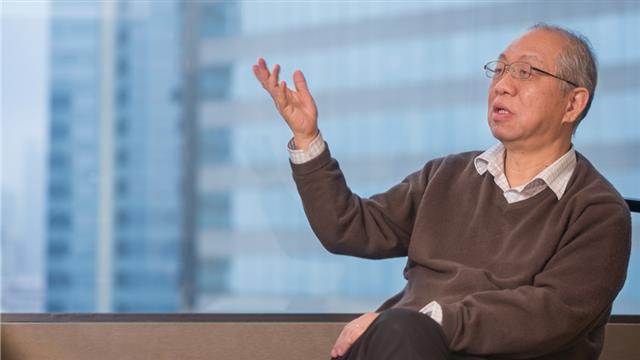You have been pushing for the popularization of mathematics through your work as director of the Institute of Mathematical Sciences. Why is this important?
All the top universities, like Harvard and Princeton, give top priority to candidates' SAT 1 results. The exam involves only English and mathematics. Math is the major subject to test your way of thinking, reasoning and logic. If a student knows no math, it's impossible to take up subjects in engineering, science, and even economics. Reasoning and expression are the basics for any scholar or entrepreneur in any society.
You said you've observed a decline in mathematical reasoning in Hong Kong. Why is that?
Many educators think application is very important. But a lot of things that are important may have no superficial use. You can't judge knowledge superficially. A poem may seem useless but it resonates with many people. When I was in high school, we learnt asymmetric plane geometry—not because it was useful, but because it taught us how to reason. Most schools in Hong Kong and China are not teaching that anymore; they think it's useless. Ironically most elite high schools in the US still teach that and teach that well.
What have been your achievements in the popularization of math?
The media and popular scientists have no in-depth knowledge of how a researcher thinks. My only contribution, if any, is to show them a mathematician's reality. We do a lot of things that are tougher or easier than what people think. Children should know that mathematicians are not freaks as portrayed by the media. Many parents think their children will be jobless if they study math. But the fact is that mathematicians are involved in the workings of Wall Street, in making the atomic bomb, in sending people to the moon.
Is this applied math?
Not necessarily. The most important contribution to applied science comes from very pure math. Prime factorization is at the heart of most widely used algorithms in cryptography. Cryptography is crucial to Internet banking. Geometry turns out to be useful for a lot of things, including 3D imaging. Medical imaging of bodily organs helps surgeons to make sure that the surgery is accurate. In the last four decades, all world-changing breakthroughs in application have come from pure math. Yet at the beginning, application couldn't be further from the minds of us mathematicians.
Your father, Mr. Chin-yin Chiu, was a philosopher. How has philosophy influenced your studies in mathematics?
Many mathematicians are deeply influenced by philosophical discussions—I was by my father's philosophical point of view. Yet philosophy alone is not enough. Einstein's understanding of the space-time continuum had to do with Leibniz's philosophy yet the detailed analysis required knowledge of physics and math. He couldn't have achieved what he did on philosophy alone. That said, Einstein is a more advanced physicist than most because he was much more deeply influenced by philosophy.
Are mathematicians artists at heart?
When mathematicians derive something, we want it to be not only correct, but compatible with nature—that part is certainly very close to what an artist wants. The artist describes the beauty of nature from an emotional point of view—be it a man, a woman, or the moon. Mathematicians are also emotional but every statement we make has to be true.
I look at the structure of this building and I want to understand why it's so pretty, but I derive my answers from math. I look at symmetry. I wonder why it is that only when the waves of the ocean move in some ways that they look pretty. The idea of choosing what is pretty is very artistic. A poor mathematician cannot distinguish between a beautiful statement and a non-beautiful statement that is far away from describing nature.
What impedes mathematical development in children?
Children learn out of interest. You should get them excited about something and learn it for its own sake. Yet many parents push their children to get better grades in school. This is a big mistake. They lose interest after a while and may even rebel. Many parents of children of only seven or younger ask me to help their kids. That's really unfortunate.
Does that apply more to Chinese parents than American parents?
In the US, students are very relaxed up to about Grade 8. They have fun while learning. They don't lose out in the end even though they don't take grades seriously, unlike Chinese kids in Hong Kong or mainland China. By Grade 10 or 11, they are working extremely hard, in some cases harder than Hong Kong students. Students should work hard some time, but when small kids from kindergarten toil all the way to middle school, they burn out.


